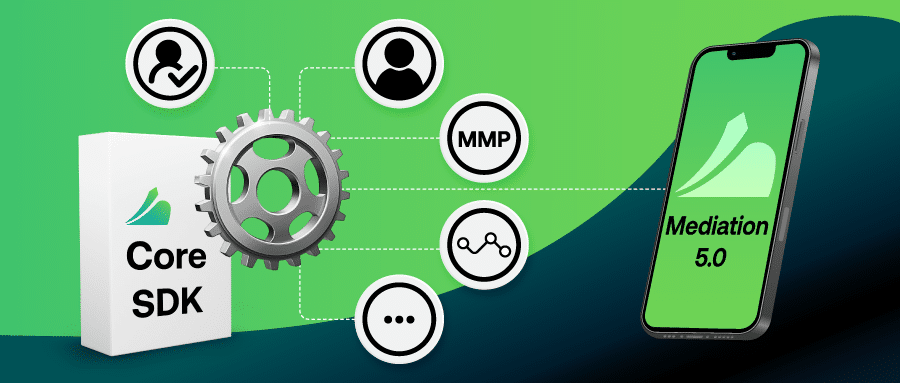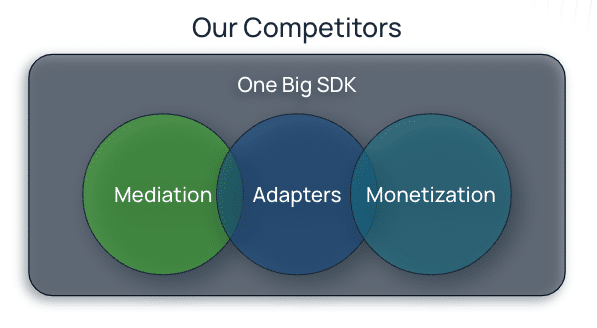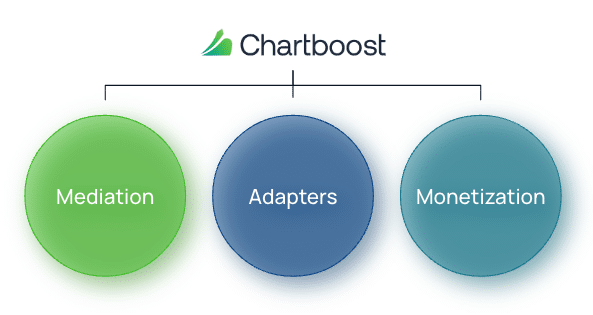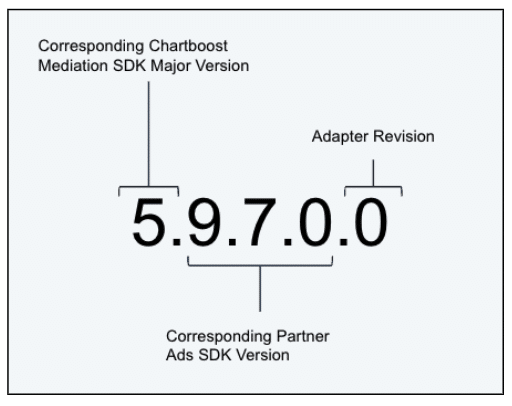
Chartboost is excited to announce some major new features to our Mediation! We’re offering the greatest level of transparency and control yet with an open-source Mediation SDK and a flexible SDK architecture that allows you to increase stability and efficiency.
Feature 1: Flexible SDK architecture
We often hear from developers that they value flexible, stable, light, and secure SDKs that increase ad revenue. To answer that call, Chartboost’s new SDK architecture separates the Chartboost Mediation SDK and the adapters of network SDKs, including Chartboost Monetize. This means we design our SDK architecture to favor several, smaller SDKs over fewer, bigger SDKs.


This means:
- SDKs are more stable, diminishing crash rates.
- Newer SDK versions are released more quickly and publishers get access to new features, faster.
- Publishers only integrate the SDK(s) they need.
- SDKs minimize the data they collect based on the jobs they perform, and follow a privacy by design principle.
Feature 2: Core SDK Consent Mediation & Centralized Initialization
Consent Management and SDK management present ongoing challenges for publishers. Publishers are hesitant to integrate 3rd-party SDKs into their apps due to privacy concerns, and once integrated publishers have a difficult time managing if and when various SDKs should be initialized. The Chartboost Core SDK addresses this challenge by offering new features called Consent Mediation – a seamless way to integrate Consent Management Platforms (CMPs) with 3rd party SDKs into your app – and Centralized Initialization – an easy way to initialize and manage multiple SDKs.
How does Consent Mediation work?
The Core SDK gathers consent from Consent Management Platforms (CMPs), helps downstream SDK modules initialize and collect data given the consent signal received from the CMP, and engages in data minimization best practices. Any module that is integrated with Core via an adapter can feel confident that the module is following privacy and data minimization best practices.
How does Centralized Initialization work?
Publishers can use the Core SDK to initialize all other SDKs a publisher uses in a centralized way. Instead of using several API calls to initialize and manage several SDKs, publishers instead make a single API call to the Core SDK, and the Core SDK will relay that call to all SDKs integrated with core. The core SDK can also receive SDK callback information that can help publishers analyze SDK lifecycle events and ensure those SDKs are operating optimally and as expected.
Core and the Mediation 5.0 SDK
The Chartboost Mediation 5.0 SDK takes advantage of both Consent Mediation and Centralized Initialization features the Core SDK offers. Therefore, publishers who integrate the Mediation 5.0 SDK or later must also integrate the Core SDK.
Feature 3: Open Source SDK
Both the Mediation 5.0 SDK and Core SDK are fully open-source, which means developers can fully audit the SDK APIs and modify or enhance the code. This makes the Mediation and Core SDKs transparent and customizable by design. This is a big differentiator between Chartboost and ‘black-box’ competitors and helps drive publishers’ ad revenue growth.
Feature 4: Refactored Public APIs
Mediation 5.0 refactors our APIs to make them more uniform across iOS and Android. Our APIs have also been cleaned up and solidified to further facilitate ease of integration.
Feature 5: Adaptive Banner Improvements
Adaptive Banner APIs have been improved to send back explicit width and height instead of mapping to existing fixed banner sizes to help publishers resize the ad container and move app content based on the size of the returned ad.
Feature 6: Adapter Version Scheme
The Mediation 5.0 SDK uses the same easy-to-understand versioning scheme introduced in the 4.x Mediation SDK. This versioning scheme makes understanding adapter compatibility easy and intuitive. Our Adapter Versioning Scheme is structured to make it easier to understand which adapters are compatible with which SDKs.

For iOS and Android Mediation SDK & Wrapper
iOS and Android Mediation Adapters act as a translation layer between the Chartboost Mediation SDK and Monetization Partner SDKs. The Chartboost 5.0 Mediation SDK inherits the Adapter Version Scheme and Adapter Contracts of the Mediation 4.x SDK.
For Unity Mediation SDK & Wrapper
The Unity Wrapper acts as a translation layer between iOS & Android and the Unity Game Engine. The Unity version scheme is limited to a 0.0.0 format and both iOS and Android APIs are combined into a Unity wrapper, presenting challenges for how to version Unity correctly. This makes it impossible to follow the same versioning scheme for the Unity Wrapper as we do our iOS and Android Adapter Version Scheme. Instead, the Unity Wrapper Version is determined the following way:
<Major Mediation SDK Version> . <Wrapper Version> . <Adapter Revision>To start integrating Chartboost Mediation 5.0 SDK, click here.


